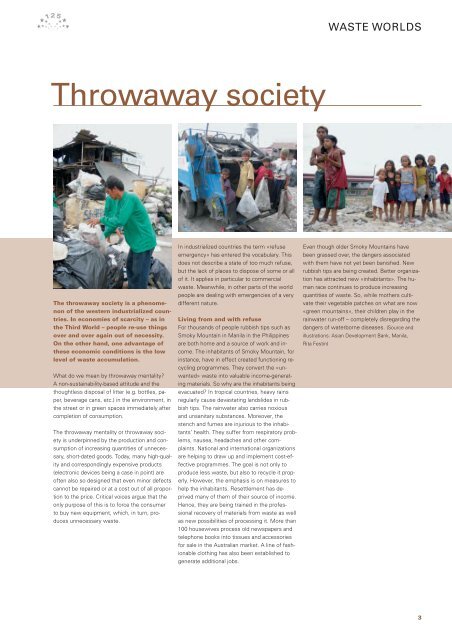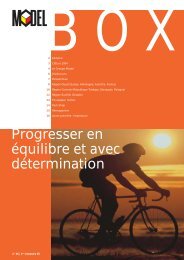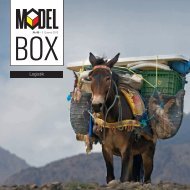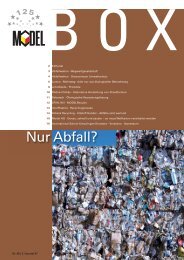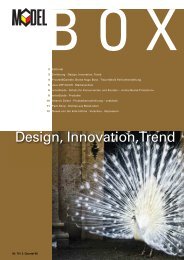Only waste? - Model Holding AG
Only waste? - Model Holding AG
Only waste? - Model Holding AG
- TAGS
- www.modelgroup.com
You also want an ePaper? Increase the reach of your titles
YUMPU automatically turns print PDFs into web optimized ePapers that Google loves.
Throwaway society<br />
The throwaway society is a phenomenon<br />
of the western industrialized countries.<br />
In economies of scarcity – as in<br />
the Third World – people re-use things<br />
over and over again out of necessity.<br />
On the other hand, one advantage of<br />
these economic conditions is the low<br />
level of <strong>waste</strong> accumulation.<br />
What do we mean by throwaway mentality?<br />
A non-sustainability-based attitude and the<br />
thoughtless disposal of litter (e.g. bottles, paper,<br />
beverage cans, etc.) in the environment, in<br />
the street or in green spaces immediately after<br />
completion of consumption.<br />
The throwaway mentality or throwaway society<br />
is underpinned by the production and consumption<br />
of increasing quantities of unnecessary,<br />
short-dated goods. Today, many high-quality<br />
and correspondingly expensive products<br />
(electronic devices being a case in point) are<br />
often also so designed that even minor defects<br />
cannot be repaired or at a cost out of all proportion<br />
to the price. Critical voices argue that the<br />
only purpose of this is to force the consumer<br />
to buy new equipment, which, in turn, produces<br />
unnecessary <strong>waste</strong>.<br />
In industrialized countries the term «refuse<br />
emergency» has entered the vocabulary. This<br />
does not describe a state of too much refuse,<br />
but the lack of places to dispose of some or all<br />
of it. It applies in particular to commercial<br />
<strong>waste</strong>. Meanwhile, in other parts of the world<br />
people are dealing with emergencies of a very<br />
different nature.<br />
Living from and with refuse<br />
For thousands of people rubbish tips such as<br />
Smoky Mountain in Manila in the Philippines<br />
are both home and a source of work and income.<br />
The inhabitants of Smoky Mountain, for<br />
instance, have in effect created functioning recycling<br />
programmes. They convert the «unwanted»<br />
<strong>waste</strong> into valuable income-generating<br />
materials. So why are the inhabitants being<br />
evacuated? In tropical countries, heavy rains<br />
regularly cause devastating landslides in rubbish<br />
tips. The rainwater also carries noxious<br />
and unsanitary substances. Moreover, the<br />
stench and fumes are injurious to the inhabitants’<br />
health. They suffer from respiratory problems,<br />
nausea, headaches and other complaints.<br />
National and international organizations<br />
are helping to draw up and implement cost-effective<br />
programmes. The goal is not only to<br />
produce less <strong>waste</strong>, but also to recycle it properly.<br />
However, the emphasis is on measures to<br />
help the inhabitants. Resettlement has deprived<br />
many of them of their source of income.<br />
Hence, they are being trained in the professional<br />
recovery of materials from <strong>waste</strong> as well<br />
as new possibilities of processing it. More than<br />
100 housewives process old newspapers and<br />
telephone books into tissues and accessories<br />
for sale in the Australian market. A line of fashionable<br />
clothing has also been established to<br />
generate additional jobs.<br />
WASTE WORLDS<br />
Even though older Smoky Mountains have<br />
been grassed over, the dangers associated<br />
with them have not yet been banished. New<br />
rubbish tips are being created. Better organization<br />
has attracted new «inhabitants». The human<br />
race continues to produce increasing<br />
quantities of <strong>waste</strong>. So, while mothers cultivate<br />
their vegetable patches on what are now<br />
«green mountains», their children play in the<br />
rainwater run-off – completely disregarding the<br />
dangers of waterborne diseases. (Source and<br />
illustrations: Asian Development Bank, Manila,<br />
Rita Festin)<br />
3


